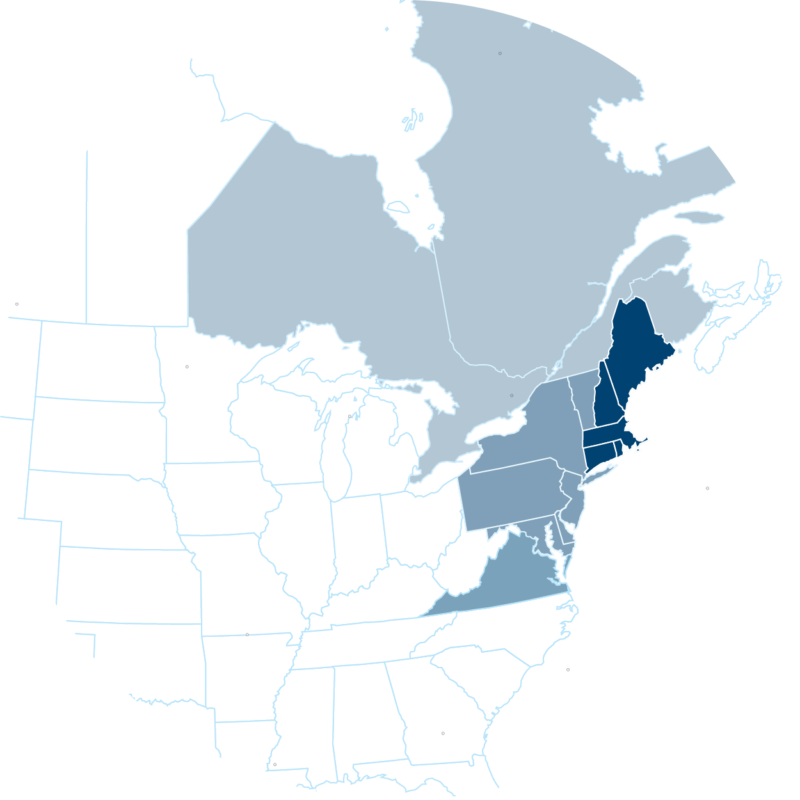The Power of a Regional, Multi-State Perspective
Acadia Center is at its core a regional organization: we develop deep relationships in the places we work while bringing a broad perspective that considers the interconnections and opportunities to raise the bar in each state. There are numerous examples of how regional, multi-state approaches are critical to progress and present effective ways to enlarge the impact of necessary reforms.
- Many stakeholders, businesses, and political and economic systems are often interdependent and do not follow state or national boundaries. Climate pollution and natural ecosystems do not follow political boundaries. Trade from fisheries to forest products to intellectual property circulates across political lines. Our highways, airports and trains transport people from jobs in one state to homes in another. Especially in the Northeast, where states are relatively small compared to the rest of the nation, people cross state lines more frequently than elsewhere.
- Comparative perspective: Regionalism allows Acadia Center to be aware of best (and worst) practices. When a reform advances in one state, we have the information to take the data to neighbors and press for change. Conversely, when a regressive action occurs, we can point to evidence from neighboring states to demonstrate the negative consequences of backtracking on clean energy.
- Electric and gas utilities operate across state lines: Eversource, the largest utility in New England, operates electric and gas companies in Connecticut, Massachusetts and New Hampshire. National Grid is a major utility in New York and Massachusetts, and Rhode Island. Avangrid runs companies from Rochester, NY to Downeast Maine to the Connecticut shore.
- ISO-New England (Independent System Operator – New England) operates a uniform electric grid and associated combined power markets in 6 states, and has a policy to charge ratepayers in all 6 states for regional transmission projects.
Regionalism amplifies impact. When Northeast states act together, they have the combined populations, buying power and equivalent gross domestic product that would rank them among the major economies in the world. When Acadia Center prepared analyses on the economic benefits of energy efficiency, we found that although states benefitted individually when they maximized investments in energy efficiency, individual state benefits were larger when all states maximized efficiency due to economies of scale and larger markets.
We are proud to work in coalitions with numerous partners to build from these attributes to implement change that can empower and improve the lives of everyone here in the Northeast and set an example of multi-state cooperation for other parts of the country.
Acadia Center brings this perspective into all aspects of our work – from reports and analyses that quantify benefits and impacts, to state regulatory proceedings where we can shed light on best and worst examples, to multi-state programs and coalitions designed to move a region, not only a state.
When the federal government attempts rollbacks on climate protection, the power of regions to lead is more important than ever. Acadia Center is gratified to work in a region where good ideas can be heard and changes are happening. We are proud to work in coalitions with numerous partners to build from these attributes to implement change that can empower and improve the lives of everyone here in the Northeast and set an example of multi-state cooperation for other parts of the country.
Multi-state Programs and Coalitions
- Regional Greenhouse Gas Initiative (RGGI): RGGI, the nation’s first cap-and-trade program, has helped Northeast and Mid-Atlantic states achieve significant reductions in emissions of carbon dioxide (CO2) and other air pollutants from the electric power sector. Since the program went into effect in 2009, CO2 emissions from RGGI power plants have fallen by 47%, outpacing the rest of the country by 90%. RGGI states have generated $3.2 billion in allowance auction proceeds, the majority of which have been invested in energy efficiency and renewable energy programs, while electricity prices in RGGI states have fallen by 5.7%, as prices have increased in the rest of the country by 8.6%. When RGGI was implemented, it was the first program in the world to require polluters to pay for emissions allowances (permits to emit pollution). Now, there are 57 national or subnational carbon pricing programs in place, many of them drawing on lessons learned from RGGI.
- ISO-New England: ISO-New England manages and plans the power grid in the six-state New England region. Its policies and project choices greatly influence what energy infrastructure is financed and built, whether power plants are subsidized, and also operates the regional energy markets. Acadia Center, as an appointed member of key stakeholder committees, works closely in coalition and partnerships with an array of clean energy, consumer, and justice organizations which believe that the ISO needs significant reforms to align its decision-making with consumer and climate pollution priorities.
Shaping and Implementing Policy Reforms
- Energy Efficiency: Since our inception in the early 2000s, we have been working to expand energy efficiency investments on a regional level. By establishing an overarching approach to shift utility investments from purchasing expensive power plant contracts into more cost-effective, consumer- and economically-friendly energy efficiency investments, we were able to successfully advocate for this policy in one state and then make the case in others. We also sought to increase transparency and consumer participation in program design and budget negotiations, by advocating for the creation of independent energy efficiency boards – first in Connecticut in 1999, then in Rhode Island, Maine and Massachusetts a few years later. As these boards met to establish funding levels and energy savings goals, by taking the best examples in one state into another, we have been able to help raise the bar, advancing nationally leading standards. We are now promoting the next generation of energy efficiency that will address sub-standard housing and support building electrification.
- Utility Rates and Consumer Benefits: Utilities tried to promote increases in mandatory monthly fixed charges to consumers – regardless of the consumer’s energy use – we brought the fight against that regressive proposal, shaping arguments and building support from Connecticut into Rhode Island to Massachusetts and New York, developing common data points and showing where utilities were taking different positions in bordering states.
- Offshore Wind (OSW) Procurement: As Massachusetts began to lead the charge to procure large scale wind energy, Acadia Center staff worked to bring what we learned in Massachusetts into neighboring states such as Connecticut, helping to advance new and larger scale procurement levels.
- Renewable Standards and Solar Siting: The power grid in New England operates in regional markets, not state-specific ones. Increasing renewable energy requirements in one state can benefit all states. By establishing goals for renewable power that are regional in nature, our advocacy in each state is measured against raising the bar on what is possible and needed.
A Regional Perspective Informs Reports and Analyses
Acadia Center’s regional perspective has long informed our approach to analysis and reports. Often, the data demonstrate that when multiple states act in concert, they can obtain larger benefits for their own state residents as larger markets are created for clean energy and energy efficiency. We analyzed the data and created some of the first regional reports on climate pathways in the country regional, as well as regional and state-specific climate market information for New England and New York.





















Follow us